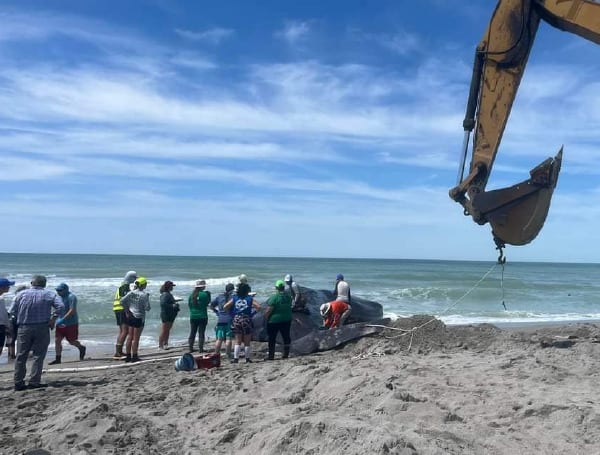On Monday morning, the sperm whale that had self-stranded off the coast of Venice on Sunday passed away, according to the Florida Fish & Wildlife Conservation Commission.
Officials confirmed that equipment to pull the whale to shore was en route at the time and that the necropsy started at 12 p.m.
It was initially reported that the whale was 50 feet in length, and the final confirmation came in at 44 feet.
Related: 50-Foot, 70,000 Pound Sperm Whale Beached Off Florida’s Gulf Coast
The subsequent statement was issued by the Florida Fish & Wildlife Conservation Commission subsequent to the confirmation.
FWC biologists, law enforcement officers, and its partners returned to the scene of the beached Sperm Whale in Venice on Monday, March 11, where the whale was confirmed deceased. The whale is confirmed a 44-foot-long male with a time of death at approximately 3am. Today, biologists will collect samples to attempt to determine cause of illness and death and to better understand sperm whale health, and life history. Results of the samples will likely take several weeks to confirm a cause of death.
“An adult male, emaciated live sperm whale weighing about 70,000 pounds and measuring 44-feet, was first confirmed at 8:30 a.m. on Sunday, March 10, 2024, off Venice Beach, FL after Mote Marine Laboratory’s Stranding Hotline was notified of the distressed animal,” said Mote Marine Laboratory & Aquarium (MMLA).
MMLA confirmed the sperm whale had passed on its own overnight.
“Every animal, deceased or alive, matters. Rapid response to live stranded animals is not the only way the team works to contribute to the conservation of our local marine species. The information gathered during the necropsy helps to evaluate the long-term mortality trends of these species, especially as it relates to pathology or human-related activities. Such research data are crucial to species management and conservation, and data from necropsies conducted by Mote’s Stranding Investigations Program are provided to state and federal wildlife managers as part of databases of stranding network partners,” said MMLA.
Help support the Tampa Free Press by making any small donation by clicking here.
Android Users, Click To Download The Tampa Free Press App And Never Miss A Story. Follow Us On Facebook and Twitter. Sign up for our free newsletter.

